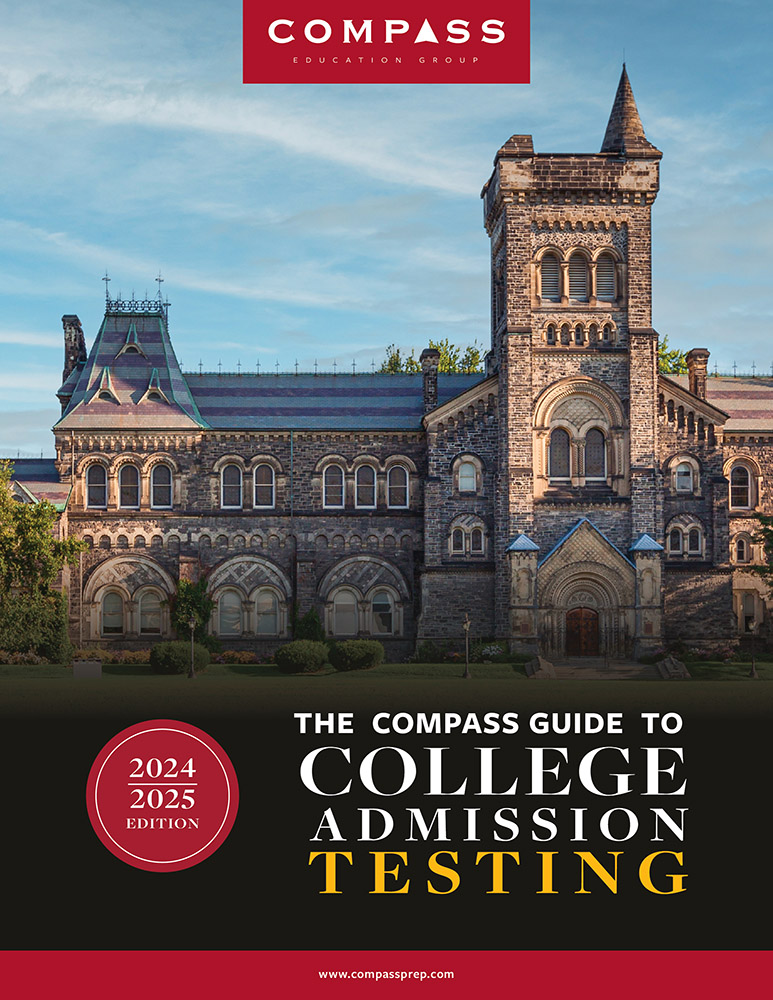 When you first speak with a Compass director to learn more about our test preparation services, they’ll ask a few questions to get a sense of where you stand and what your goals are. Reliable practice tests can help provide many of those answers.
When you first speak with a Compass director to learn more about our test preparation services, they’ll ask a few questions to get a sense of where you stand and what your goals are. Reliable practice tests can help provide many of those answers.
Practice tests, and the diagnostic score reports that follow, bring uncertainty into focus. They replace hunches and guesswork with firsthand experience and performance data. The best way to begin demystifying standardized testing is to address what practice test results actually tell us.
By fall of junior year, most 11th graders and their parents will want to firm up their testing roadmap for the coming year. Their most common opening questions are sensible ones:
- Do I even need to test given the flexing of test requirements?
- Should I take the SAT or ACT? How do I choose?
- When should I take my first official test?
- How and when should I prepare for the test?
Well. Have you taken a practice test? If not, let’s start there. Here are 10 reasons why:
Reason 1: Because You Can
It’s normal to begrudge practice testing, but it’s in fact an advantage to have a dry run at a high stakes test. The experiential benefit of a full length, proctored assessment cannot be overstated. If students do nothing else to prepare for the ACT or SAT, they should at least work through a full exam under strict testing and timing conditions.
Reason 2: Practice Tests Get You Comfortable With Discomfort
The value of a practice test goes well beyond previewing sample questions. Our students are able to simulate the entire ordeal of an actual test day: sacrificing a weekend morning, traveling to a test site, remembering (or forgetting!) their calculator and pencils, possibly wearing a mask, tuning out distractions in the room, and optimizing their short breaks to use the restroom or consume a quick snack. And any students with recently approved special accommodations can experience the effect of these new variables.
Reason 3: Practice Tests Reduce Test Anxiety
Once the practice test begins, students get a risk-free chance to experiment with pacing and clock management — aspects of test-taking that can’t be fully appreciated until they are felt. Students get an authentic taste of cognitive fatigue. They execute the tedious act of transcribing answers neatly and completely into small bubbles on a separate sheet. And, they gain direct insight into the standardized traits of the exam, such as section length and order, question types and location, and answer choice patterns. We see confidence improve as these unknowns become familiar and then routine.
Reason 4: Practice Tests Are Predictive
Standardized tests are imperfect and incomplete, but they don’t beat around the bush. They say nothing about what makes you an interesting person, but they do tally up how many math and verbal questions you got right or wrong in the allotted time. Practice tests tell you, at minimum, how you’re likely to perform on a real test if nothing much changes. This objective dose of reality is important for everyone involved.
Reason 5: Practice Tests Help You Choose the Better Exam
Colleges accept the ACT or SAT interchangeably, so the decision is yours. “To decide” literally means “to cut off,” and we generally believe in choosing one and moving along from there. Test selection is made easier when you have two trusted data points to compare. If you have a fairly recent result (e.g., a PSAT or a PreACT), we can administer the other one for you. Our concordance tool allows us to make top-line comparisons of scores to see if there’s a clear winner. We find that roughly 25% of students perform better on the ACT, 25% perform better on the SAT, and the remaining 50% are within a judgement call band. For these students, we look further into the score reports and other personal factors to assist with choosing a test.
Reason 6: Practice Tests Find Your Blind Spots
After completing a practice test with Compass, you’ll receive a sophisticated analysis of your performance. We’ll turn around your results in a few days in the form of a robust diagnostic score report. This interactive tool tells the story beneath the scores and paints a detailed portrait of what you’re doing well and exactly what you need to improve. Baseline diagnostic score reports serve as blueprints for a customized tutoring program we build for you.
Reason 7: Practice Tests Make Test Preparation More Efficient
Knowing your score is a good start, but precisely why is your score what it is? Practice is good; evaluated practice is better. With our diagnostic evaluation in hand, you and your Compass tutors can relive the test together through case-study examinations of selected items. Our reports provide the following insights and more:
- Relative standing (percentile) of your individual section and total scores
- Improvement in relative standing for every possible score gain
- Sortable and filtered performance data by question type and content area
- Wrong-answer analysis and trap-answer identification
- Clock management and pacing patterns
- Missed opportunities and careless-error identification
- Question-level performance data of other test takers with similar scores
By diving this deeply into your practice test results, our tutors tailor their instruction to make the most of your 90-minute private weekly sessions. Our score reports are specifically designed for one-on-one guided study; they are meant to complement customized tutoring.
Reason 8: Practice Tests Build On One Another
Indeed, over the course of the 3-4 months together, your tutors will assign 3-4 more full-length proctored practice exams. These serve as periodic mile markers, they steadily boost endurance and familiarity, and they fuel your tutoring program with new fodder for review as your test taking skills become more refined. Those who complete this regimen are able to arrive at their official test date feeling poised and in control of what they are about to encounter.
Reason 9: Practice Test Results Are Kept Private
Many clients understandably subscribe to the notion that repeat testing will drive test scores higher. ACT and College Board data support this thesis, to an extent. Scores tend to increase slightly with re-testing, but they level out at what can be thought of as a test-taker’s soft ceiling. Minor improvement happens organically, but meaningful gains tend to occur only when proper evaluation and preparation happens between sittings. The tests themselves don’t really change, so for scores to move significantly, the test taker needs to evolve over repeated attempts.
So why not just take lots and lots of official tests? This is not advisable. Colleges who prohibit you from utilizing “Score Choice” will request your complete testing portfolio. While it’s fine to have 2-3 sets of scores, a pattern of extremely excessive testing can undermine any positive impression the top scores themselves made.
Reason 10: Practice Test Results Are More Actionable
Excessive testing is not only inadvisable, it’s also difficult to do. Official tests involve a lengthy registration process several weeks in advance, they are offered no more than once a month, and test results take several more weeks to come back to you. Release of the test booklet and diagnostic detail is only offered on a few test dates and for an additional cost. Even when available, this extra information is further delayed for weeks or months. With practice tests, students keep their test booklet to cross-reference against the fully transparent score report they receive within a few days.
Compass offers up to two (one SAT and one ACT) proctored practice tests to any interested student. Active clients have ongoing access to our practice exams and proctored sessions which are offered on a weekly basis, year-round, in several locations and online.
We are also the only test prep provider to offer fully-interactive computer-based practice testing which features:
- Immediate results
- An enhanced score report that includes time spent per question down to the second
- Highlighter, Answer Masking, and Answer Eliminator tools to help you mark up your online test
- Question Flagging that lets your tutors see where you felt most challenged during the test
- The freedom to start your test whenever you’re ready from the comfort of your home
Two Related FAQs
1. The PSAT is offered in October at my school. Shouldn’t I just treat that as my practice SAT?
Most juniors (and many sophomores) should plan to take the PSAT (and/or the PreACT if offered to sophomores.) It’s another risk-free opportunity to preview a higher stakes test that is approaching. The PSAT is vertically aligned with the SAT, which means you can think of your PSAT score as an SAT score as if you had taken the SAT that day instead. (The same is true for the PreACT/ACT.) And juniors who earn extraordinarily high PSAT scores will be in the running for National Merit recognition.
There are just a couple of minor caveats with the PSAT:
- It’s a slightly shorter and slightly easier test, so the highest possible section score is a 760, not an 800. (The highest PreACT score is a 35, not a 36.)
- PSAT scores won’t come back until mid-December. So from a strategic planning perspective, juniors won’t be able to factor those results into their consideration until then. That can negatively impact the preparation plans for families looking to use the late fall and winter months of 11th grade to gear up for testing in February or March.
2. I was offered a so-called “hybrid” ACT+SAT practice test. It sounds like a faster and easier way to kill two birds with one stone. Too good to be true?
Yes. Hybrid tests get billed as convenient time-savers, but they serve no one but the test prep companies who peddle them. A hybrid test makes for good advertising but delivers little in the way of reliable diagnostic insight. By blending flavors, a hybrid test bears a superficial resemblance to parts of the ACT and SAT, but it is in fact more of a casserole of question types tossed together to become a proxy for neither. With genuine sample tests widely available, you can refine your testing palate by sticking to those diagnostic and practice resources.
So. Have you taken a practice test? Click here to get started.


Excellent and thorough advice! Too many students miss the point: it’s not really test prep if you don’t take practice tests.